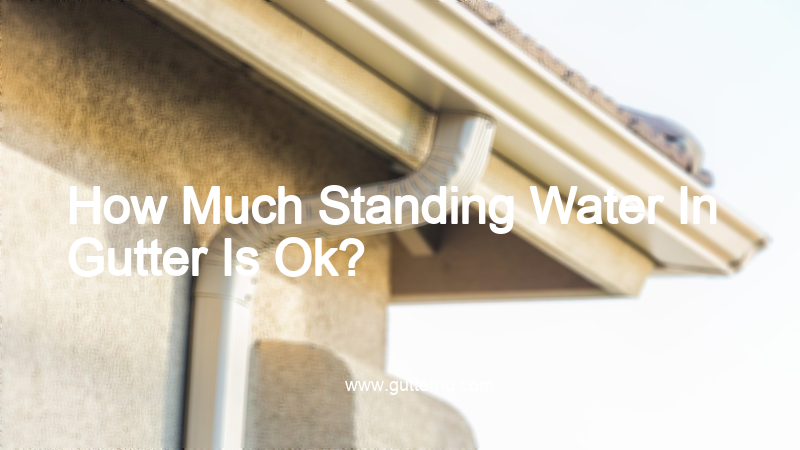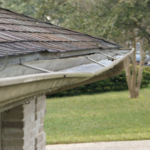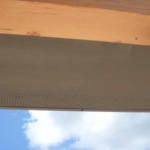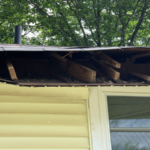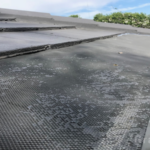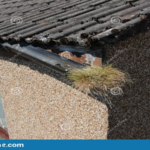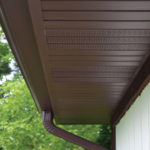There is no definitive answer to this question as it depends on a number of factors, including the size and type of gutters, the amount of rainfall, and the slope of the land around the house. However, as a general rule of thumb, it is typically okay to have up to an inch of standing water in gutters after a heavy rain. If the gutters are regularly overflowing or the water is not draining properly, then this could be a sign that they need to be cleaned or repaired.
Is it OK for water to sit in gutter?
It’s not ideal, but it’s not the end of the world if water sits in your gutters for a little while. If the water is sitting there for days or weeks, however, it can start to cause problems. The water can start to rot the gutters, and if it’s sitting in there long enough, it can start to seep into your home and cause mold problems. So, if you see water sitting in your gutters for more than a day or two, it’s best to clean it out.
Is it normal for gutters to overflow in heavy rain?
Gutters are designed to protect your home from water damage by channeling rainwater away from your roof and foundation. However, if your gutters are poorly maintained or too small for the amount of rainwater falling, they can overflow, causing water to pool around your home and potentially leading to water damage. While it is not uncommon for gutters to overflow during heavy rains, it is important to take steps to prevent this from happening, such as regularly cleaning your gutters and ensuring they are the right size for your home.
How do you fix standing water in gutters?
- The first step is to clean out your gutters. This can be done with a garden hose, a pressure washer, or even a leaf blower. Be sure to remove all leaves, dirt, and debris from your gutters.
- Once your gutters are clean, you’ll need to identify any areas where water is pooling. These areas will need to be repaired in order to prevent standing water in your gutters.
- To repair these areas, you’ll need to seal any cracks or holes with a waterproof sealant. This will help to prevent water from seeping into your gutters and causing standing water.
- Once you’ve repaired any areas where water is pooling, you’ll need to install a gutter guard or leaf guard. This will help to keep leaves and debris out of your gutters, which will prevent standing water.
How do you keep water from pooling in gutters?
- Keep your gutters clean and free of debris. This will help water to flow freely through the gutters and prevent pooling.
- Inspect your gutters regularly and repair any leaks or damage that you find. This will help to keep water from seeping into the gutters and causing pooling.
- Make sure that your gutters are pitched properly so that water will flow away from the house and not pool in the gutters.
- Install gutter guards or screens over your gutters to keep leaves and other debris from clogging them. This will help to keep water flowing freely through the gutters and prevent pooling.
- If you live in an area with heavy rainfall, consider installing a gutter drainage system to help keep water from pooling in your gutters.
Is standing water in a drain normal?
Most of the time, standing water in a drain is normal and nothing to worry about. This usually happens when the drain is used infrequently, such as in a guest bathroom that doesn’t get much use. The water is probably just old water that has stagnated in the drain. However, if the water is coming from a leaky pipe or fixture, that’s not normal and you should call a plumber to fix the leak.
Where should water from gutters go?
If you have a gutter installed on your home, it is important to know where the water should go. The water from the gutter should be directed away from the foundation of the house to avoid any water damage. There are a few different ways that this can be accomplished. One option is to install a gutter extension that directs the water at least four feet away from the foundation. Another option is to install a French drain which is a drainage system that is installed around the perimeter of the house. This system will collect the water from the gutters and direct it away from the foundation.
Is it bad if my gutters overflow?
It’s not ideal if your gutters overflow, but it’s not necessarily a bad thing. If your gutters are overflowing, it means that they’re doing their job of collecting water and diverting it away from your home. However, if the water is overflowing regularly, it could be a sign that your gutters are clogged and need to be cleaned.
Why is water pouring over my gutters?
There are a few reasons this could be happening. The first possibility is that your gutters are clogged. If leaves and other debris have accumulated in your gutters, they can prevent water from flowing freely through them. This can cause water to overflow out of the gutters and onto your home.
Another possibility is that the slope of your gutters is incorrect. If your gutters are sloped too steeply, water can flow too quickly through them and overflow out of the gutters. This is usually caused by gutters that have been installed incorrectly.
If you’re not sure what the cause of your overflowing gutters is, you should contact a professional to take a look. They will be able to diagnose the problem and recommend a solution.
What happens when your gutters are full?
If your gutters are full, they will not be able to properly drain rainwater away from your home. This can lead to water damage to your home’s foundation, as well as your landscaping. Additionally, standing water in your gutters can attract mosquitoes and other pests.
Bottom Line
If you have more than an inch of standing water in your gutters, it’s time to clean them out. Otherwise, you may start to see leaks in your home’s foundation or water damage in your attic.
